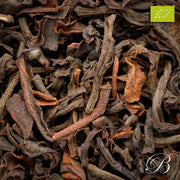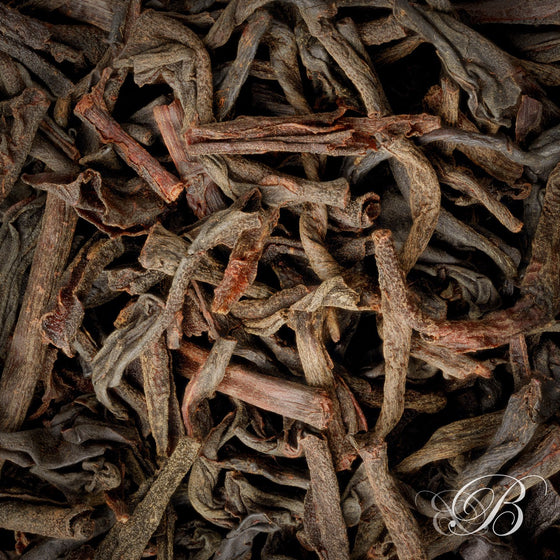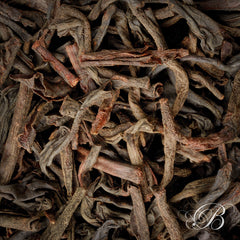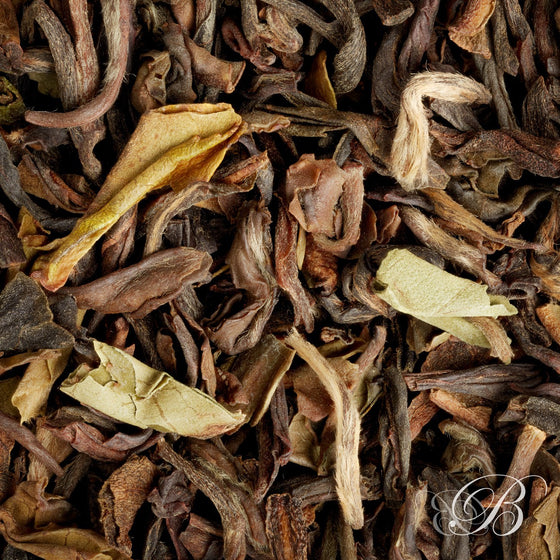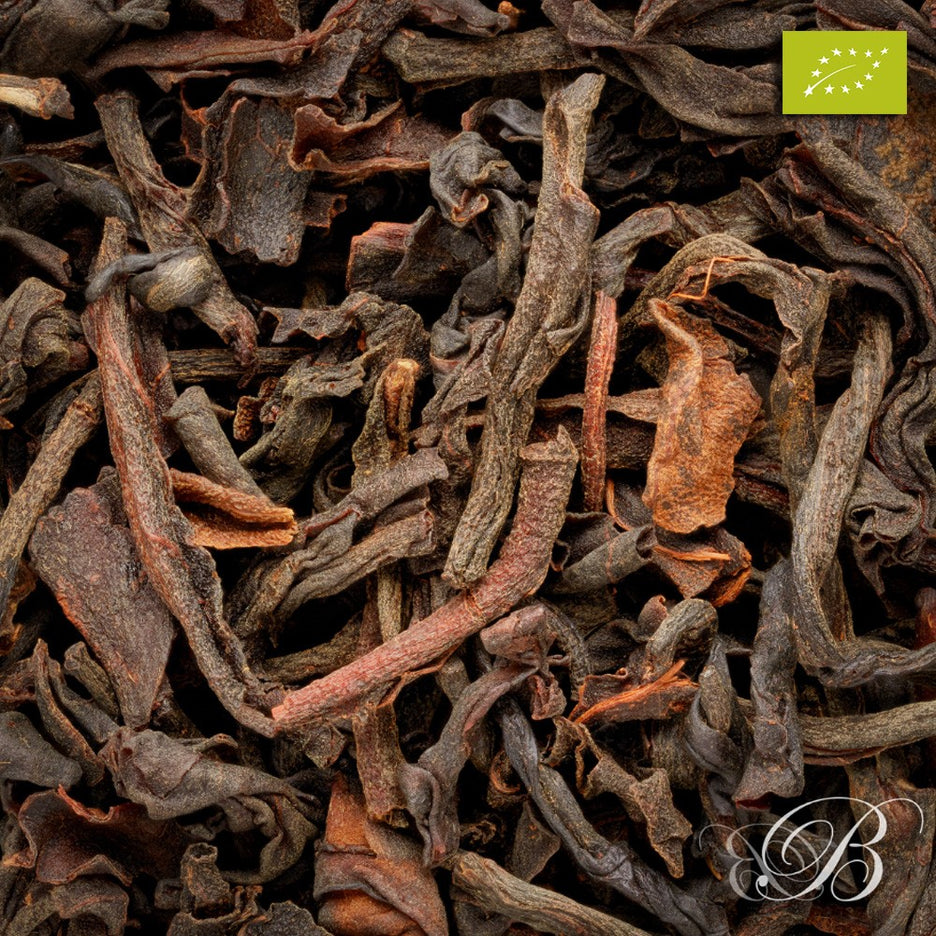
Ceylon Blackwood O.P Organic
Organic Ceylon tea with powerful notes
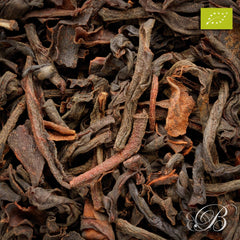
Ceylon Blackwood O.P Organic
100% secure payment
3 free samples with each order
Fast and free delivery for purchases over €65
Organic black tea with powerful notes
This Organic black tea is harvested in July. It offers a cup with a lively and full-bodied taste. It comes from the Bogawantalvwa Valley, located in the South of the island, at 1300m high. Very nice length in the mouth.
Blackwood, located in the rugged mountains of Uva province in Sri Lanka, embodies both the fascinating history of the island's transition from coffee to tea, the advent of organic farming, and the uniqueness of a terroir sculpted by the wind.
The modern history of tea in Ceylon begins with James Taylor, a fearless young Scotsman who arrived in the Kandy region at the age of seventeen. Without a title or fortune, but armed with sheer determination, Taylor became the pioneer of tea cultivation on the island. As early as 1867, he planted the first tea bushes in Loolecondera, often in harsh conditions. Observing nature with patience and experimentation, he rolled his first leaves by hand in a simple hut. This self-taught man, Taylor, gave birth to a tradition that would radically transform the Ceylon landscape: after the crisis caused by coffee rust, tea offered the island an economic and agricultural renaissance, of which Blackwood, established in 1870 on land formerly dedicated to coffee, would be a pioneer.
What gives the Blackwood estate and Uva teas their unique identity is, above all, the wind. This dry and powerful air current, sometimes called the "kachchan wind," descends from the Bay of Bengal or originates from other eastern air masses. Primarily active during the dry season from July to September, this wind sweeps across the valleys, gently stressing the tea bushes and inducing a heightened concentration of their aromas. Under its influence, and with the marked contrast between hot days and cool nights, the leaves modulate their essential oils. This translates in the cup into high-altitude teas with woody, fruity, and even mentholated aromas—subtle signatures of Uva.
The demands of organic farming find fertile ground here. Uva is one of the few regions in Sri Lanka to have developed certified organic plantations very early on. Practicing organic farming in this context is much more than simply banning chemicals: it means relying on an exceptional microclimate, the altitude, the slope of the land, the isolation of the garden, and the vitality of the wind. The latter, by naturally drying the leaves, reduces the need for human intervention and enhances the purity and potency of the terroir. Organic agriculture is therefore an extension of the climate and the landscape, not simply an alternative method. This harmony between nature and cultivation gives full meaning to Blackwood's organic approach.
Finally, the human and social dimension of the estate is inseparable from its identity. Heir to the great days of the plantation and the transition from coffee to tea, Blackwood still bears witness to this history today: the vestiges of the colonial era remain, but above all, the estate continues to employ more than a thousand people, with a marked commitment to the well-being of families.
Thus, Blackwood is not just a great tea garden: it embodies the interdependence of terroir, climate, wind and human commitment, perpetuating a pioneering tradition born from the courage of James Taylor and renewed in today's organic requirements.
Food and tea pairings
In homage to James Taylor's Scottish roots, savor your Blackwood with a rustic and hearty Highland specialty: Scottish Eggs. These soft-boiled eggs, nestled in a sausage meat stuffing and golden in breadcrumbs, offer a dense and comforting texture. The richness of the meat, the warmth of the spices, and the crispness of the coating find their perfect counterpoint in the minty freshness and tannic vibrancy of the Blackwood. The tea lightens the palate, refreshes the fried egg, and enhances the flavor of the egg and herbs—parsley, thyme, and English mustard. A pairing that is both robust and refined, reflecting James Taylor himself: simple, earthy, yet instinctively elegant.
Recipe based on Organic Ceylon Blackwood OP black tea
Prepare a Highland roast beef with Blackwood tea and Aberlour whisky: infuse a spoonful of tea in 20 cl of water for 5 minutes, then deglaze the roast with this dark liqueur and a splash of whisky. The Blackwood tea brings freshness and depth; the whisky, a malty, honeyed warmth. Together, they enhance the beef and the moorland herbs: thyme, juniper, and wholegrain mustard, for a robust, woody, and quintessentially Scottish sauce.
10570
Organic black tea with powerful notes
This Organic black tea is harvested in July. It offers a cup with a lively and full-bodied taste. It comes from the Bogawantalvwa Valley, located in the South of the island, at 1300m high. Very nice length in the mouth.
Blackwood, located in the rugged mountains of Uva province in Sri Lanka, embodies both the fascinating history of the island's transition from coffee to tea, the advent of organic farming, and the uniqueness of a terroir sculpted by the wind.
The modern history of tea in Ceylon begins with James Taylor, a fearless young Scotsman who arrived in the Kandy region at the age of seventeen. Without a title or fortune, but armed with sheer determination, Taylor became the pioneer of tea cultivation on the island. As early as 1867, he planted the first tea bushes in Loolecondera, often in harsh conditions. Observing nature with patience and experimentation, he rolled his first leaves by hand in a simple hut. This self-taught man, Taylor, gave birth to a tradition that would radically transform the Ceylon landscape: after the crisis caused by coffee rust, tea offered the island an economic and agricultural renaissance, of which Blackwood, established in 1870 on land formerly dedicated to coffee, would be a pioneer.
What gives the Blackwood estate and Uva teas their unique identity is, above all, the wind. This dry and powerful air current, sometimes called the "kachchan wind," descends from the Bay of Bengal or originates from other eastern air masses. Primarily active during the dry season from July to September, this wind sweeps across the valleys, gently stressing the tea bushes and inducing a heightened concentration of their aromas. Under its influence, and with the marked contrast between hot days and cool nights, the leaves modulate their essential oils. This translates in the cup into high-altitude teas with woody, fruity, and even mentholated aromas—subtle signatures of Uva.
The demands of organic farming find fertile ground here. Uva is one of the few regions in Sri Lanka to have developed certified organic plantations very early on. Practicing organic farming in this context is much more than simply banning chemicals: it means relying on an exceptional microclimate, the altitude, the slope of the land, the isolation of the garden, and the vitality of the wind. The latter, by naturally drying the leaves, reduces the need for human intervention and enhances the purity and potency of the terroir. Organic agriculture is therefore an extension of the climate and the landscape, not simply an alternative method. This harmony between nature and cultivation gives full meaning to Blackwood's organic approach.
Finally, the human and social dimension of the estate is inseparable from its identity. Heir to the great days of the plantation and the transition from coffee to tea, Blackwood still bears witness to this history today: the vestiges of the colonial era remain, but above all, the estate continues to employ more than a thousand people, with a marked commitment to the well-being of families.
Thus, Blackwood is not just a great tea garden: it embodies the interdependence of terroir, climate, wind and human commitment, perpetuating a pioneering tradition born from the courage of James Taylor and renewed in today's organic requirements.
10570
The Betjeman & Barton soul supplement
Let the aroma of this rare tea from the Uva mountains carry you to a spicy and woody cup.
You may also like
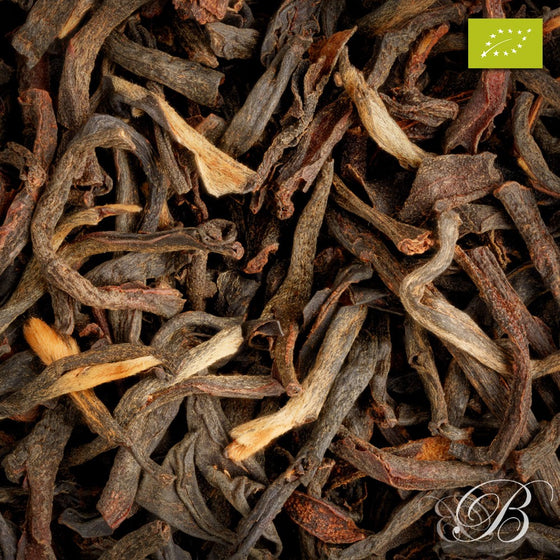
Assam Jamguri F.T.G.F.O.P.1 Organic
Assam tea with notes of ripe fruit
Add to cart
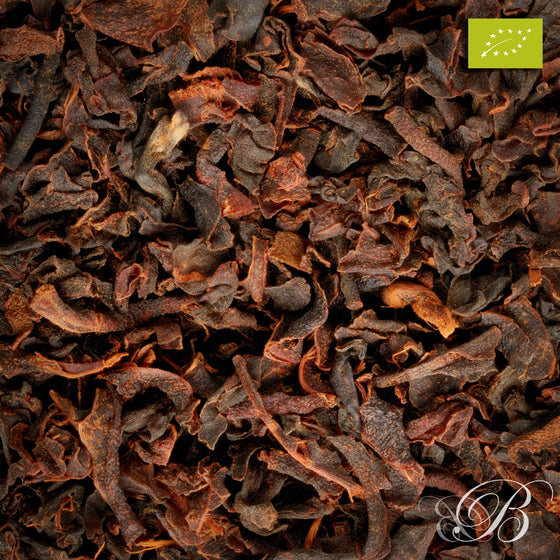
Early Morning Broken B.O.P Organic
Full-bodied and stimulating organic blended tea
Add to cart
Last viewed products
Tres a mon gout pour le gout et parfum il sera dans ma prochaine commande
Chère cliente,
Nous vous remercions pour votre commentaire et sommes ravis de vous compter parmi nos fidèles clients.
